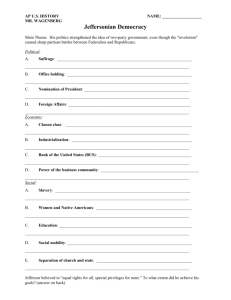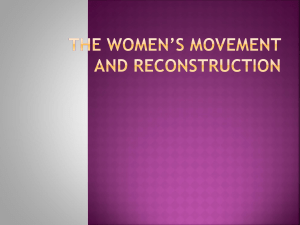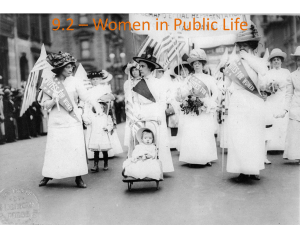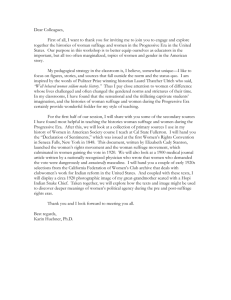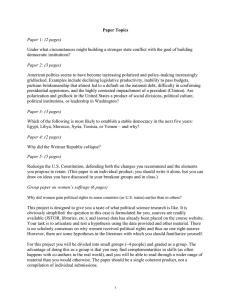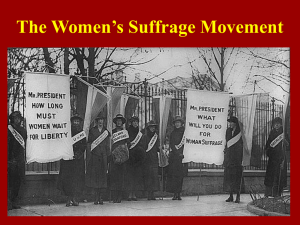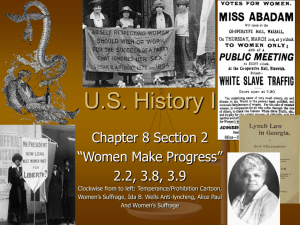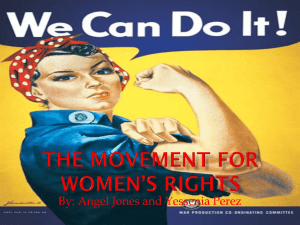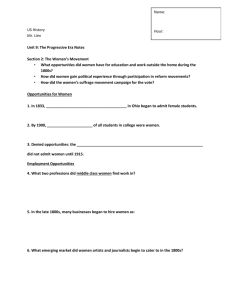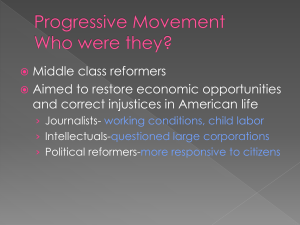I. Introduction: Interest Groups and the Suffrage Revolution of...
advertisement
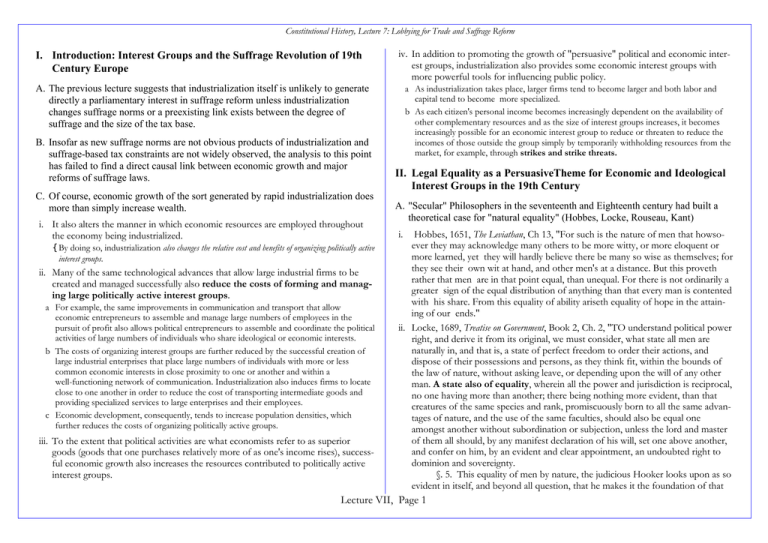
Constitutional History, Lecture 7: Lobbying for Trade and Suffrage Reform
I. Introduction: Interest Groups and the Suffrage Revolution of 19th
Century Europe
iv. In addition to promoting the growth of "persuasive" political and economic interest groups, industrialization also provides some economic interest groups with
more powerful tools for influencing public policy.
a As industrialization takes place, larger firms tend to become larger and both labor and
capital tend to become more specialized.
b As each citizen's personal income becomes increasingly dependent on the availability of
other complementary resources and as the size of interest groups increases, it becomes
increasingly possible for an economic interest group to reduce or threaten to reduce the
incomes of those outside the group simply by temporarily withholding resources from the
market, for example, through strikes and strike threats.
A. The previous lecture suggests that industrialization itself is unlikely to generate
directly a parliamentary interest in suffrage reform unless industrialization
changes suffrage norms or a preexisting link exists between the degree of
suffrage and the size of the tax base.
B. Insofar as new suffrage norms are not obvious products of industrialization and
suffrage-based tax constraints are not widely observed, the analysis to this point
has failed to find a direct causal link between economic growth and major
reforms of suffrage laws.
C. Of course, economic growth of the sort generated by rapid industrialization does
more than simply increase wealth.
i. It also alters the manner in which economic resources are employed throughout
the economy being industrialized.
{ By doing so, industrialization also changes the relative cost and benefits of organizing politically active
interest groups.
ii. Many of the same technological advances that allow large industrial firms to be
created and managed successfully also reduce the costs of forming and managing large politically active interest groups.
a For example, the same improvements in communication and transport that allow
economic entrepreneurs to assemble and manage large numbers of employees in the
pursuit of profit also allows political entrepreneurs to assemble and coordinate the political
activities of large numbers of individuals who share ideological or economic interests.
b The costs of organizing interest groups are further reduced by the successful creation of
large industrial enterprises that place large numbers of individuals with more or less
common economic interests in close proximity to one or another and within a
well-functioning network of communication. Industrialization also induces firms to locate
close to one another in order to reduce the cost of transporting intermediate goods and
providing specialized services to large enterprises and their employees.
c Economic development, consequently, tends to increase population densities, which
further reduces the costs of organizing politically active groups.
iii. To the extent that political activities are what economists refer to as superior
goods (goods that one purchases relatively more of as one's income rises), successful economic growth also increases the resources contributed to politically active
interest groups.
II. Legal Equality as a PersuasiveTheme for Economic and Ideological
Interest Groups in the 19th Century
A. "Secular" Philosophers in the seventeenth and Eighteenth century had built a
theoretical case for "natural equality" (Hobbes, Locke, Rouseau, Kant)
i.
Hobbes, 1651, The Leviathan, Ch 13, "For such is the nature of men that howsoever they may acknowledge many others to be more witty, or more eloquent or
more learned, yet they will hardly believe there be many so wise as themselves; for
they see their own wit at hand, and other men's at a distance. But this proveth
rather that men are in that point equal, than unequal. For there is not ordinarily a
greater sign of the equal distribution of anything than that every man is contented
with his share. From this equality of ability ariseth equality of hope in the attaining of our ends."
ii. Locke, 1689, Treatise on Government, Book 2, Ch. 2, "TO understand political power
right, and derive it from its original, we must consider, what state all men are
naturally in, and that is, a state of perfect freedom to order their actions, and
dispose of their possessions and persons, as they think fit, within the bounds of
the law of nature, without asking leave, or depending upon the will of any other
man. A state also of equality, wherein all the power and jurisdiction is reciprocal,
no one having more than another; there being nothing more evident, than that
creatures of the same species and rank, promiscuously born to all the same advantages of nature, and the use of the same faculties, should also be equal one
amongst another without subordination or subjection, unless the lord and master
of them all should, by any manifest declaration of his will, set one above another,
and confer on him, by an evident and clear appointment, an undoubted right to
dominion and sovereignty.
§. 5. This equality of men by nature, the judicious Hooker looks upon as so
evident in itself, and beyond all question, that he makes it the foundation of that
Lecture VII, Page 1
Constitutional History, Lecture 7: Lobbying for Trade and Suffrage Reform
obligation to mutual love amongst men, on which he builds the duties they owe
one another, and from whence he derives the great maxims of justice and charity.
iii. Kant (1793, Principles of Politics ) "The Equality of every member of the State as a
subject is the second principle in the constitution of a rational commonwealth.
The formula of this Principle may be put thus:--Every member of the Commonwealth has rights against every other that may be enforced by compulsory laws
from which only the sovereign or supreme ruler is excepted."
iv. Von Humbolt (1792/1852, The Sphere and Duties of Government ) "Those whose
security is to be preserved are, on the one hand, all the citizens, in perfect legal
equality, and, on the other, the State itself. The extent of this latter object, or the
security of the State, is determined by the extent of the rights assigned to it, and
through these by the nature and extent of its aims. As I have hitherto argued, it
may not demand security for anything save the power entrusted to its hands, and
the resources allotted to its disposal."
B. The equality of citizens in the natural state and before the law was used by many
political philosophers to develop a "popular sovereignty" theory of the state.
That is to say that states obtain their authority via a voluntary transfer of
"natural powers" from individuals to the government--as if through a social
contract.
C. Towards the end of this period, economics emerged as a separate field of inquiry
which also argued that a nation's wealth is also rooted in the decisions of
ordinary people. For example Smith argued that labor is ultimately the source of
wealth (the productivity of which is augmented by capital and specialization)
and that special privileges in trade were unwarranted and harmful.
i. Smith (1776, Wealth of Nations Book 1, labor theory of value) The annual
labour of every nation is the fund which originally supplies it with all the
necessaries and conveniences of life which it annually consumes, and which
consist always, either in the immediate produce of that labour, or in what is
purchased with that produce from other nations.
a According therefore, as this produce, or what is purchased with it, bears a
greater or smaller proportion to the number of those who are to consume
it, the nation will be better or worse supplied with all the necessaries and
conveniences for which it has occasion.
b But this proportion must in every nation be regulated by two different
circumstances; first, by the skill, dexterity, and judgment with which [2] its
labour is generally applied b; and, secondly, by the proportion between the
number of those who are employed in useful labour, and that of those who
are not so employed. Whatever be the soil, climate, or extent of territory of
any particular nation, the abundance or scantiness of its annual supply
must, in that particular situation, depend upon those two circumstances.
ii. The abundance or scantiness of this supply too seems to depend more
upon the former of those two circumstances than upon the latter. Among
the savage nations of hunters and fishers, every individual who is able to
work, is more or less employed in useful labour, and endeavours to provide,
as well as he can, the necessaries and conveniencies of life, for himself, or
such of his family or tribe as are either too old, or too young, or too infirm
to go a hunting and fishing.
a Such nations, however, are so miserably poor, that, from mere want, they
are frequently reduced, or, at least, think themselves reduced, to the
necessity sometimes of directly destroying, and sometimes of abandoning
their infants, their old people, and those afflicted with lingering diseases, to
perish with hunger, or to be devoured by wild beasts.
b Among civilized and thriving nations, on the contrary, though a great
number of people do not labour at all, many of whom consume the
produce of ten times, frequently of a hundred times more labour than the
greater part of those who work; yet the produce of the whole labour of the
society is so great, that all are often abundantly supplied, and a workman,
even of the [3] lowest and poorest order, if he is frugal and industrious,
may enjoy a greater share of the necessaries and conveniences of life than
it is possible for any savage to acquire.
iii. The causes of this improvement, in the productive powers of labour,
and the order, according to which its produce is naturally distributed among
the different ranks and conditions of men in the society, make the subject
of the First Book of this Inquiry.
iv. [Free Trade and Special Interest Politics: Monopoly] To expect, indeed,
that the freedom of trade should ever be entirely restored in Great Britain,
is as absurd as to expect that an Oceana or Utopia should ever be established in it. Not only the prejudices of the publick, but what is much more
unconquerable, the private interests of many individuals, irresistibly oppose
it.
Lecture VII, Page 2
Constitutional History, Lecture 7: Lobbying for Trade and Suffrage Reform
a Were the officers of the army to oppose with the same zeal and unanimity
any reduction in the number of forces, with which master manufacturers
set themselves against every law that is likely to increase the number of
their rivals in the home market; were the former to animate their soldiers,
in the same manner as the latter enflame their workmen, to attack with
violence and outrage the proposers of any such regulation; to attempt to
reduce the army would be as dangerous as it has now become to attempt to
diminish in any respect the monopoly which our manufacturers have
obtained against us.
b This monopoly has so much increased the number of some particular
tribes of them, that, like an overgrown standing army, they have become
formidable to the government, and upon many occasions intimidate the
legislature.59
v. The member of parliament who supports every proposal for strengthening this monopoly, is sure to acquire not only the reputation of understanding trade, but great popularity and influence with an order of men whose
numbers and wealth render them of great importance. If he opposes them,
on the contrary, and still more if he has authority enough to be able to
thwart them, neither the most acknowledged probity, nor the highest rank,
nor the greatest publick services can protect him from the most infamous
abuse and detraction, from personal insults, nor sometimes from real
danger, arising from the insolent outrage of furious and disappointed
monopolists.
a The undertaker of a great manufacture who, by the home markets being
suddenly laid open to the competition of foreigners, should be obliged to
abandon his trade, would no doubt suffer very considerably. That part of
his capital which had usually been employed in purchasing materials and in
paying his workmen, might, without much difficulty, perhaps, find
another employment.
a Every man endeavours to supply by his own industry his own occasional
wants as they occur.
b When he is hungry, he goes to the forest to hunt; when his coat is worn
out, he cloths himself with the skin of the first large animal he kills: and
when his hut begins to go to ruin, he repairs it, as well as he can, with the
trees and the turf that are nearest it.
vii.But when the division of labour has once been thoroughly introduced, the
produce of a man’s own labour can supply but a very small part of his
occasional wants.1
a The far greater part of them are supplied by the produce of other mens
labour, which he purchases with the produce, or, what is the same thing,
with the price of the produce of his own. But this purchase [408] cannot be
made till such time as the produce of his own labour has not only been
completed, but sold.
b A stock of goods of different kinds, therefore, must be stored up
somewhere sufficient to maintain him, and to supply him with the
materials and tools of his work till such time, at least, as both these events
can be brought about.2
c A weaver cannot apply himself entirely to his peculiar business, unless
there is beforehand stored up somewhere, either in his own possession or
in that of some other person, a stock sufficient to maintain him, and to
supply him with the materials and tools of his work, till he has not only
completed, but sold his web.
d This accumulation must, evidently, be previous to his applying his industry
for so long a time to such a peculiar business.
viii.[from Book 4, nature of wealth] It would be too ridiculous to go about
seriously to prove, that wealth does not consist in money, or in gold and
silver; but in what money purchases, and is valuable only for purchasing.32
a Money, no doubt, makes always a part of the national capital; but it has
already been shown that it generally makes but a small part, and always the
most unprofitable part of it.33
vi. [from Book 2, Intro, on the division of labor and productivity of
capital, begins with a state of nature] In that rude state of society in which there
is no division of labour, in which exchanges are seldom made, and in which
every man provides every thing for himself, it is not necessary that any stock
ix. It is not because wealth consists more essentially in money than in goods,
should be accumulated or stored up beforehand in order to carry on the
that the merchant finds it generally more easy to buy goods with money,
business of the society.
than to buy money with goods;
Lecture VII, Page 3
Constitutional History, Lecture 7: Lobbying for Trade and Suffrage Reform
a but because money is the known and established instrument of commerce,
for which every thing is readily given in exchange, but which is not always
with equal readiness to be got in exchange for every thing.
b The greater part of goods besides are more perishable than money, and he
may frequently sustain a much greater loss by keeping them.
x. [also from Book 4, Ch. 3, Smith’s defense of free trade]
a In the foregoing Part of this Chapter I have endeavoured to show, even
upon the principles of the commercial system, how unnecessary it is to lay
extraordinary restraints upon the importation of goods from those
countries with which the balance of trade is supposed to be
disadvantageous.
b Nothing, however, can be more absurd than this whole doctrine of the
balance of trade,1 upon which, not only these restraints, but almost all the
other regulations of commerce are founded.
c When two places trade with one another, this doctrine supposes that, if the
balance be even, neither of them either loses or gains; but if it leans in any
degree to one side, that one of them loses, and the other gains in
proportion to its declension from the exact equilibrium. Both suppositions
are false.
d A trade which is forced by means of bounties and monopolies, may be, and
commonly is disadvantageous to the country in whose favour it is meant to
be established, as I shall endeavour to show hereafter.2
e But that [236] trade which, without force or constraint, is naturally and
regularly carried on between any two places, is always advantageous,
though not always equally so, to both.
D. Such liberal political and economic ideas helped to provide organizing principles for arguments used before parliaments throughout Europe regarding trade
liberalization inside individual polities and also for political liberalization within
those polities, including suffrage reform.
a These were not the only arguments used, of course, but they were new coherent and
persuasive arguments added to the pre-existing range of arguments for and against trade
liberalization and electoral reform.
b In this manner, the ideas of the enlightenment tipped the balance of argument in favor of
freer trade and broader suffrage.
{ Their importance was magnified by the fact that many private political clubs and
organized interest groups used such arguments to advance their policy agendas.
III. Suffrage Movements
A. Perhaps the most obvious of the interest groups that can be expected to influence election laws are groups formed to promote suffrage per se.
i. Suffrage groups use a variety of means to lobby those with the power to change
the laws governing eligibility for suffrage.
ii. Within the present model, such groups will be effective if they either induce an
entirely new preference for suffrage or induce a change in the norms that determine the proper scope of suffrage.
a The public choice literature on interest groups implies that contributions to interest
groups increase with personal income and with the productivity of interest group efforts.
b The better organized an interest group is, the more support it will receive, other things
being equal.
iii. In a setting where a nonfiscal interest in suffrage exists, support for suffrage
movements will not come exclusively from those who are currently
disenfranchised.
a The analysis above suggests that contributions to suffrage groups would be made by all
citizens with an interest in broader suffrage.
b Insofar as persuasion and lobbying activities become more effective as more resources are
devoted to them, the probability of suffrage reform increases as the resources available to
suffrage groups increase, other things being equal.
iv. Economic development, consequently, tends to increase prospects for suffrage
expansion by indirectly providing suffrage organizations with new resources for
use in their persuasive campaigns.
v. However, industrialization increases the probability that suffrage-expanding
reforms will be adopted, only if the resources flowing to suffrage movements
increase relative to those flowing to antisuffrage movements.
B. Economic Interest Groups: the Labor Movement and Suffrage Reform
i. Economic growth also empowers economic interest groups for the same reasons
and, moreover, provides those groups with additional tools for influencing
ordinary public policies and constitutional law.
Lecture VII, Page 4
Constitutional History, Lecture 7: Lobbying for Trade and Suffrage Reform
ii. By deepening the process of production and making greater use of specialization,
industrialization tends to increase the economic independence of all agents within
the economy both at the margin and inframarginally.
iii. This increase in interdependence allows economic interest groups to reduce
national tax revenue and the income of all within the economy of interest by
threatening to strike occasionally.
a The increase in specialization that occurs during industrialization implies that strike threats
become a more powerful tool for influencing public policy, one that will often be more
effective than persuasion.
b Bargaining with a strike threat differs in several ways from usual characterization economic
bargaining where both sides benefit from exchange.
{ A strike threat confronts those being struck with two alternatives, neither of which is as
attractive as a no-threat setting.
{ On the one hand, the struck party may accept the economic losses associated with being
struck; on the other hand, the struck party may accept an otherwise undesirable contract.
iv. The bargains reached under strike threats, consequently, do not necessarily make
both parties better off in the short or long run and may, in fact, make both parties
worse off.
a In the conventional economic setting, a new labor contract entails higher wage rates for
the striking employees and lower profits for the nonstriking resource owners, often
characterized as "firms," that is, employers or owners of the firm's capital.
b Firms may accept wage contracts that eventually cause them to become bankrupt, and
workers may pay a higher price in lost wages during any strikes that are in fact
implemented than they recoup in the subsequent wage contract.
c New legislation may similarly cost more than it generates in overall benefits in both the
short and long run.
d As in a rent-seeking game, the losses generated by conflict can easily make all parties worse
off as conflict intensifies.
v. Nonetheless, a strike threat can be used to obtain changes in legislation favored by
those striking or, in the case of interest here, to induce changes in political institutions favorable to the striking group.
Lecture VII, Page 5
